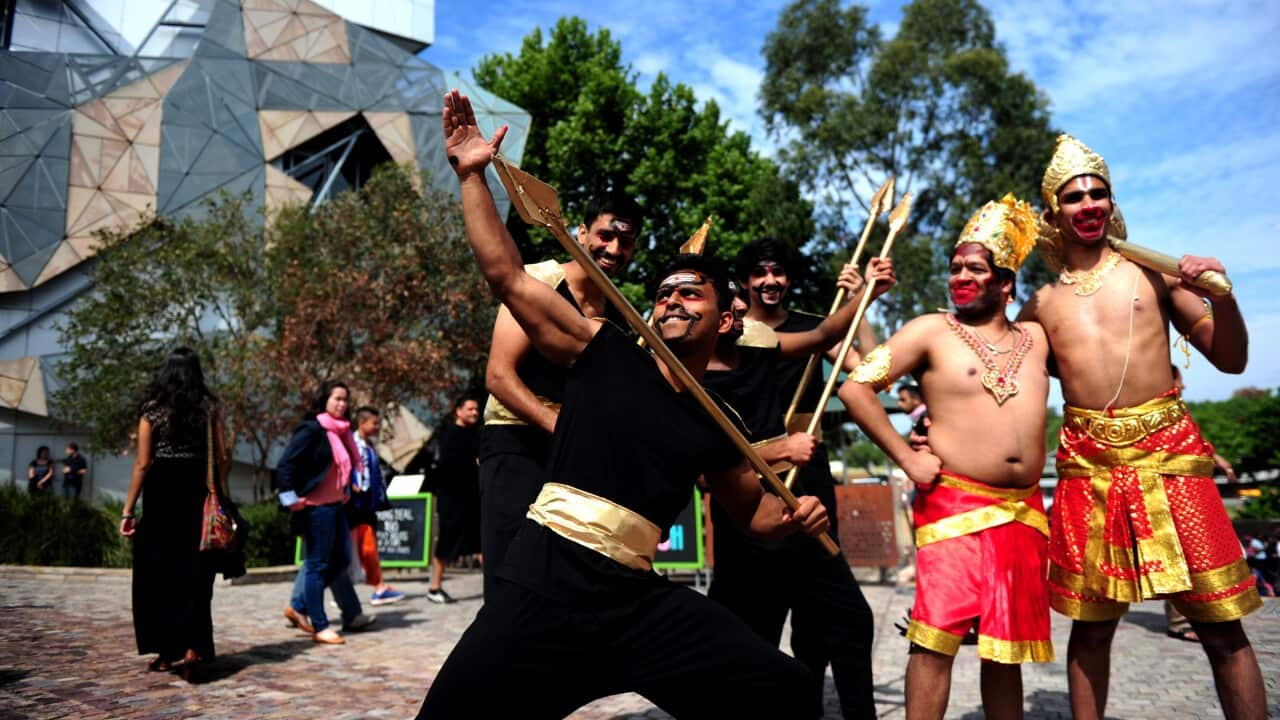Key Points
- Migration to Australia has shifted from the United Kingdom to Asian countries.
- Some say this means Australia should adopt more diverse public holidays.
- But not everyone believes more public holidays would be appropriate.
A call for Australia to adopt more diverse public holidays has received mixed reactions from migrant communities, but the intention of promoting multiculturalism has been unilaterally welcomed.
Over the last two decades, migration to Australia has shifted from the United Kingdom to Asian countries.
India, Nepal, China, Vietnam and the Philippines were the top five most common countries of birth among migrants in Australia between 2016-2021.
Osmond Chiu is a research fellow at think tank Per Capita.
He said Australia should "become a republic, change Australia Day, and improve culturally diverse representation".
Mr Chiu said the government should make major cultural celebrations like Diwali and Lunar New Year - which are celebrated by some of the largest migrant communities in Australia - official national holidays.
"Australia is a multicultural country that often is fairly monocultural in its institutions, and that is an image that's projected to the wider region," he told SBS News.
"By having public holidays that properly reflect our multicultural makeup, it challenges those preconceptions about Australia as a Western colonial outpost on the edge of Asia.
"It shows that we are genuinely a multicultural country and believe in cultural pluralism."
Making Diwali a national holiday would be a "step in the right direction", said Jaswinder Singh from Sikh Volunteers Australia.
"I believe it's a good idea," he said.
"It would showcase the broader Australian community's willingness to celebrate multiculturalism."
Diwali, or Deepavali - also known as - is celebrated by various communities of the Indian subcontinent.
It celebrates light overcoming darkness and features in Hinduism, Newar Buddhism, Jainism, and Sikhism.
Sikhs commonly call the festival Bandi Chhor Diwas, but also celebrate it on the same date as Hindus, which differs each year according to the Indian calendar.
Mr Singh said an alternative to making a public holiday could be a yearly message from the government paying respect to the community.
"State and federal representatives could send out greeting messages saying 'today is so-and-so festival, and we wish the community and those who are celebrating our warm regards,'" he said.
"That would also be considered a very good step in celebrating multiculturalism in Australia."
'Not appropriate'
But not everyone believes more public holidays would be appropriate.
Adwin Town, the public relations officer from the Chinese Associations of Victoria, said it would spark other communities to say: "Why not me as well?"
"Every country would ask for their new year celebration or festival to be a holiday, and then you'd find the whole calendar is just full of holidays," he said.
"It's not appropriate for the Australian economy."
Rather than a public holiday, Mr Town said Australia should promote Australia-China relations on a date more relevant to both countries.
"We should promote the , and hope we can rebuild the bridge and reignite the confidence between the two countries, because we need each other to progress," he said.
December 2022 marked 50 years of diplomatic ties between Australia and China.
While Mr Town says he wouldn't support a public holiday, he said it's a good idea to promote Chinese culture and diversity in Australia.
"During the week of Chinese New Year, the Melbourne City Council could provide 20 per cent discounts on hospitality and food expenses," he said.
Mr Town said rather than focus on one day, Australia should support diasporas across the country at all times.
"In Bendigo, where there is a large Chinese community, we can promote the gold rush and what we call the 'new San Francisco,'" he said.
"In Chinatown, we can have a lion dance and all the other traditional dances."
Mr Town said his comments represent his own personal opinions and not those of his association.
Lunar New Year will be celebrated on 22 January 2023 by communities around Asia, including Taiwan, China, Hong Kong, Vietnam, South Korea, Singapore, Malaysia, Thailand, Japan, the Philippines and Indonesia.
Australia currently celebrates seven national public holidays that are recognised in each of the eight states and territories.











